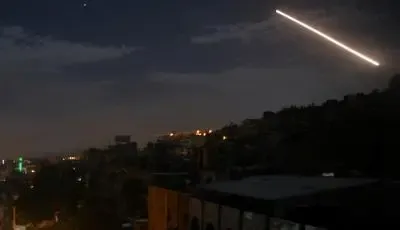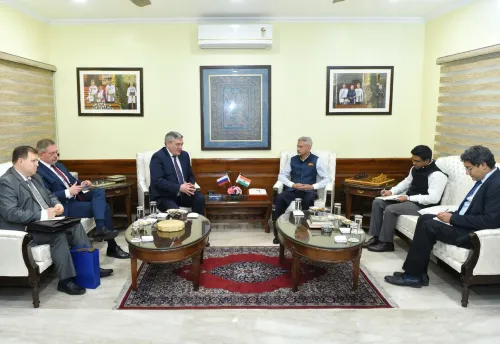What Are the Implications of Israeli Airstrikes on Syrian Forces in Sweida?

Synopsis
Key Takeaways
- Israeli airstrikes targeted Syrian military convoys in Sweida.
- Escalating violence has resulted in numerous casualties.
- Local tensions involve Druze factions and Bedouin tribes.
- Syrian authorities are attempting to de-escalate the situation.
- Ceasefire has been declared by Syrian defense officials.
Damascus/Jerusalem, July 15 (NationPress) A series of Israeli airstrikes on Tuesday targeted convoys of Syrian forces in and around the southern Syrian city of Sweida, resulting in the deaths and injuries of numerous personnel, as reported by the Syrian Observatory for Human Rights based in Britain and various state media outlets.
The airstrikes included an assault on general security vehicles within the city and another strike at the western entrance of Sweida, which struck a Syrian army convoy, reportedly claiming the life of at least one soldier. Earlier strikes on the same day had already destroyed a Syrian army tank stationed in the city.
These airstrikes occur amidst a tense standoff following several days of violent clashes involving Druze factions, Bedouin tribes, and forces from the Syrian interim government.
The Observatory also reported that 15 individuals were either killed or injured in an attack by armed men dressed in security forces' uniforms at a guesthouse belonging to the Radwan family in Sweida. This incident has not been independently verified.
The escalating tensions led the Syrian defense authorities to begin withdrawing heavy military vehicles that had entered Sweida earlier on Tuesday. State-run al-Ikhbariya TV reported the withdrawal of tanks and armored vehicles from residential areas in a bid to de-escalate the situation.
Shortly thereafter, Murhaf Abu Qasra, chief of the Syrian defense authorities, announced a full ceasefire across Sweida. In a statement shared on X, he remarked: "We have ordered a complete ceasefire for all units operating within Sweida after reaching an agreement with local elders and dignitaries."
Abu Qasra emphasized that forces would respond only to active fire and confirmed that armed police had begun deploying to maintain order, as reported by Xinhua news agency. He also indicated that control of the city's neighborhoods would be handed over to internal security forces once clearance operations were completed.
Following the ceasefire announcement, Israeli Prime Minister Benjamin Netanyahu and Defense Minister Israel Katz acknowledged directing the military to strike Syrian forces in Sweida, citing the need to protect the Druze population there.
In a joint statement, Netanyahu and Katz indicated they had ordered the military to "immediately strike" Syrian forces and weaponry in the region to "prevent the Syrian regime from endangering" the Druze community, due to their "deep fraternal alliance with the Druze citizens of Israel and their familial and historical connections to the Druze in Syria."
The Israeli military, in a separate statement, confirmed that it targeted Syrian armored vehicles and rocket launchers. They noted that convoys of Armored Personnel Carriers and tanks were observed moving towards Sweida on Monday evening, and access routes were also targeted "to disrupt their arrival in the area."
The military underscored that it "continues to monitor developments and remains prepared for defense and various scenarios."
These events follow a significant wave of violence that has resulted in over 99 fatalities and more than 200 injuries, according to the Observatory. The casualties include 60 Druze civilians—among them two women and two children—18 Bedouins, 14 soldiers from the interim government, and seven unidentified individuals in military attire.
On Monday, defense authorities spokesperson Hassan Abdel Ghani reported that 18 soldiers were killed and others injured in a "treacherous attack" by armed groups.
The initial clashes were sparked by an assault and robbery of a Druze youth by armed Bedouins at a makeshift checkpoint near al-Masmiyah. In retaliation, Druze fighters abducted several Bedouins, igniting days of urban conflict.
Despite official announcements of calm, the atmosphere in Sweida remains unstable. Influential Druze religious leader Sheikh Hikmat al-Hijri released a video on Monday rescinding his previous endorsement of the army's entry, asserting that his earlier comments were made under pressure and urging Druze communities to resist "by all available means."









